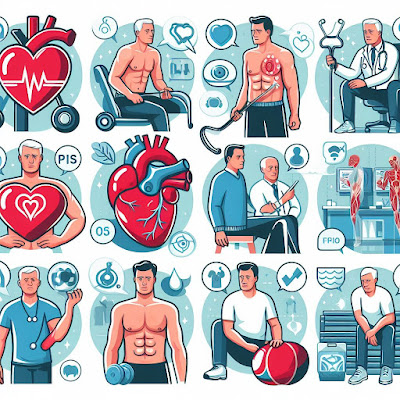Introduction: Shedding Light on Erectile Dysfunction
Erectile dysfunction (ED) is a common yet often misunderstood condition that can significantly impact a man's quality of life and self-esteem. In this comprehensive guide, we aim to demystify ED by exploring its causes, treatment options, and lifestyle strategies for managing and overcoming this condition.
 |
| Erectile Dysfunction |
Understanding Erectile Dysfunction: Exploring Causes and Risk Factors
ED is characterized by the inability to achieve or maintain an erection sufficient for sexual intercourse. While occasional difficulties with erections are normal, persistent ED may be indicative of underlying physical or psychological factors. Common causes of ED include cardiovascular disease, diabetes, hormonal imbalances, neurological disorders, and psychological factors such as stress, anxiety, and depression. Understanding the root cause of ED is essential for developing an effective treatment plan.
Treatment Options for Erectile Dysfunction: From Medications to Therapies
Several treatment options are available for managing ED, ranging from oral medications such as sildenafil (Viagra), tadalafil (Cialis), and vardenafil (Levitra) to injectable therapies, vacuum erection devices, and surgical implants. Each treatment modality has its benefits and potential side effects, and the choice of treatment depends on individual preferences, medical history, and underlying health conditions. Additionally, counseling and psychotherapy may be beneficial for addressing psychological factors contributing to ED.
Lifestyle Modifications for Improving Erectile Function: Diet, Exercise, and More
In addition to medical interventions, lifestyle modifications can play a significant role in improving erectile function and overall sexual health. Adopting a balanced diet rich in fruits, vegetables, whole grains, and lean proteins can support cardiovascular health and enhance blood flow, which is crucial for achieving and maintaining erections. Regular exercise, stress management techniques, adequate sleep, and avoiding tobacco and excessive alcohol consumption can also contribute to better erectile function.
Addressing Psychological Factors: The Role of Counseling and Support
Psychological factors such as performance anxiety, relationship issues, and body image concerns can contribute to ED and may require specialized interventions. Counseling, cognitive-behavioral therapy (CBT), and couples therapy can help individuals and their partners explore underlying issues, improve communication, and develop coping strategies for managing stress and anxiety related to sexual performance.
Empowering Men with Knowledge and Support: Promoting Awareness and Education
Raising awareness about ED and encouraging open dialogue among men, healthcare providers, and communities are crucial steps in destigmatizing this condition and promoting early intervention and treatment. Providing accurate information, debunking myths and misconceptions, and offering support resources can empower men to seek help, overcome barriers to treatment, and improve their sexual health and overall well-being.
Conclusion: Taking Steps Toward Sexual Wellness and Fulfillment
In conclusion, erectile dysfunction is a prevalent condition that affects millions of men worldwide, yet it is often underdiagnosed and undertreated. By understanding the causes, exploring treatment options, and implementing lifestyle modifications, men can take proactive steps toward managing and overcoming ED. Let's work together to promote awareness, encourage education, and empower individuals to prioritize their sexual health and well-being.






